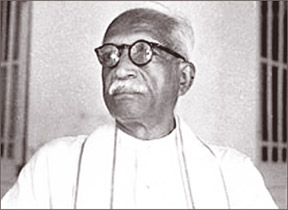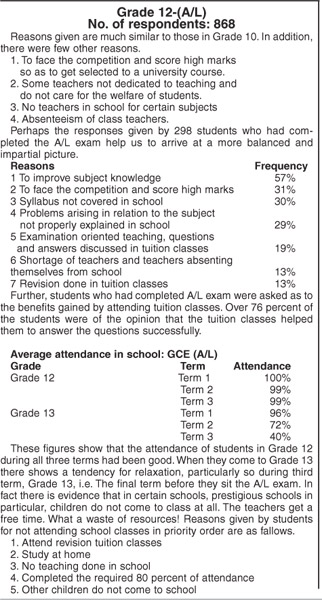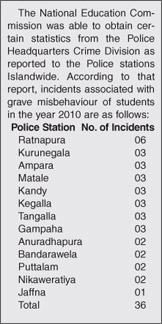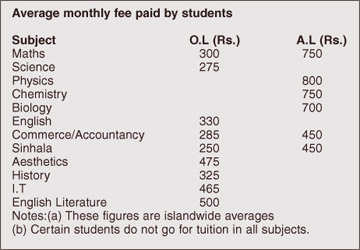Free Education proposals and tuition - Part V
The price of tuition
Text of the Dr. C. W. W. Kannangara Memorial
Lecture -22 by Prof. A. V. Suraweera held at National Institute of
Education, Maharagama on October 13, 2011
|

Dr C W W Kannangara
|
The NEC survey has collected information about teachers conducing
tuition classes. Different categories of teachers take these classes
ranging from qualified retired teachers, other experienced teachers,
subject teachers in schools themselves, professional tuition masters
outside the school system and so on.
It is well-known that certain tuition masters gain popularity and
attract young girls and boys mainly through the use of different
techniques as the employment of cheap unparliamentarily loose
terminology with double meaning to the excitement of young listeners.
This may seem rather strange but this methodology had worked very
effectually to attract youngsters to tuition classes. According to the
information collected by the NEC, over 50 percent of the teachers who
take tuition classes at GCE O/L and A/L are the school subject teachers
themselves.
The main reason as to why they do tuition, often outside school
hours, was to earn extra income. Students generally feel that these
teachers do better teaching and more profitable work in the tuition
classes than what they do in the regular classes at school. Certainly
this should not apply to all school teachers. They perform a useful
service to education in the present context.
 On,
the other hand, there are tuition magnates engaged in tuition as a
business. Popular teachers are hired for different subjects. The classes
are attended by large numbers and the teacher's task is to deliver the
goods and demonstrate that his performance is superior to what is done
in the school. On,
the other hand, there are tuition magnates engaged in tuition as a
business. Popular teachers are hired for different subjects. The classes
are attended by large numbers and the teacher's task is to deliver the
goods and demonstrate that his performance is superior to what is done
in the school.
Cost of tuition
Despite the concept of providing education free of charge at all
levels introduced by Dr. Kannangara, education of children today had
become quite an expensive venture. Not only affluent parents but less
well to-do and even poor families have no alternative but to recourse to
tuition if they want their children to face the competition, so as to
ensure a place at a university.
Tuition fees vary depending on the type of class, grade, subject,
locality, popularity of the teacher and so on. It is common knowledge
that parents send their children to extra classes even from Grade two
aiming at the success at the Grade Five examination. We confine our
discussion to GCE Ordinary Level and Advanced Level Classes. In the O.L,
there are instances where the fee is as high as Rs. 1,500 per two hour
individual session. The mass scale classes charge reasonable fees
averaging from Rs. 200 to Rs. 300 per subject.
Ancillary problems
 Similarly,
in the A.L. Classes, there are instances of fees being paid in the
region of Rs. 3,000 per subject of two hours duration. Normally, four
sessions are held per month. Similarly,
in the A.L. Classes, there are instances of fees being paid in the
region of Rs. 3,000 per subject of two hours duration. Normally, four
sessions are held per month.
Accordingly, a student will be paying somewhere around Rs. 36,000 for
the three subjects. However, the fee for a mass scale single subject
class is in the region of Rs. 500 to Rs. 700.
I am tempted to quote Prof. Ariyadasa de Silva's observation that:
“In Sri Lanka the private tuition industry was flourishing to such an
extent that it had become a shadow of the regular school system. A large
number of students and parents perceived extra-school tutoring as a
crucial determinant of academic success.”
These remarks would have been made based on a research conducted in
1991. Since then the tuition industry has prospered immensely so much so
that it has proved indispensable. The NEC findings have shown that 98
percent of schoolchildren in A.L classes have attended tuition classes
and out of those 76.2 percent were of the opinion that the tuition
classes helped them to answer the questions to their satisfaction. With
due regard to the opinion expressed by Prof. De Silva, one is tempted to
pose the question:
“Is it just a shadow or a more powerful organ strong enough to
challenge the present formal education system?”
On the other hand, there is much speculation about incidents of
misbehavior among students and between teachers and students. No doubt
this is a reflection of our society and these things happen in schools
as well. However, there is evidence that the tuition classes have made a
considerable erosion of accepted norms. The situation in certain mass
scale tuition organizations does not seem to be always rosy. This is a
very sensitive area but the information available prompts us not to
ignore them.
 It
is hardly possible to gather statistics and figures in this area either,
for the reason that those affected, namely the children, the wrong
doers, parents, the school authorities and the tuition magnates-all feel
comfortable to keep mum and suffer the consequences. It
is hardly possible to gather statistics and figures in this area either,
for the reason that those affected, namely the children, the wrong
doers, parents, the school authorities and the tuition magnates-all feel
comfortable to keep mum and suffer the consequences.
Even when complaints reach the police authorities and culprits
identified, the police, for compassionate reasons, seem to feel prudent
and settle the issue amicably rather than proceeding with legal action.
The media and the police, very rightly, seem to be lenient in respect of
these matters. In this backdrop, we feel obliged to highlight a few
incidents among many, with a view to indicating the gravity of the
problem.
According to information recorded in the media and Police reports,
Kurunegala is one of the centres noted for incidents of misbehaviour of
boys and girls attending tuition classes. The following information has
been corroborated by the Police reports and the media.
‘Certain popular tuition classes begin at 6 a.m. And continue for two
hours till 8 a.m. The next class begins at 2 p.m. This gap allows girls
and boys who come from distant places to spend the time roaming about in
town. It is during this free time that children are led to all types of
misconduct. There is evidence that agents are being employed to attract
children to vices such as use of drugs, see blue films and even take
shelter in private rooms with their lovers.
Police reports have confirmed that young couples have been caught
occupying rooms of lodgings in the town and in the vicinity and that the
number apprehended on certain Saturdays or Sundays in town is not less
than thirty.’
This is an area that has not received sufficient attention of our
education authorities, the parents and even the public. We do not by any
means suggest that tuition as a complementary education system should be
curtailed. It certainly has its advantages and I venture to state that
free education has come to stay, side by side with tuition as an
indispensable component of education.
Now to go back to Dr. Kannangara's Special Committee Education
Report. While emphasizing that the ultimate aim of education is
“preparation of life in its material and cultural aspects”, three
particular prerequisites have been identified, namely, (1) Mental
discipline, (2) Culture including character and (3) Efficiency. Keeping
in mind these prerequisites, Kannangara has expressed his concern in
respect of achieving the above aims within the education system that
existed then.
“We suspect that in Ceylon the relationship between study and
teaching is seldom understood. Indeed, the prevalence of coaching for
examinations shows that it is not understood. Coaching is the negation
of education.”
“Coaching establishments, which do not pretend to educate at all,
flourish... They can answer questions but not question answers.”
It is perhaps not too late for our education authorities to consider
if the present teaching-learning-testing process is just a mechanism
geared to answer questions and not question answers. Such philosophical
statements pregnant with meaning could spring only from great
educationists as Dr. C.W.W. Kannangara. These words alone would suffice
to remember him for all time.
Concluded
|



